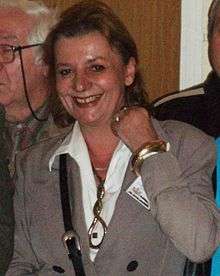Ioana Crăciunescu
Ioana Crăciunescu (born 1950) is a Romanian actress and poet.

Biography
Crăciunescu was born in Bucharest, the daughter of a civil engineer. She studied at the Caragiale Academy of Theatrical Arts and Cinematography in her native city and in 1973 became a member of the Novarra Theatre Company. She has published six volumes of collected poetry beginning with Duminica absentă (Sunday absent) in 1980 for which she won the Writers' Union of Romania Prize the following year.[1]
She made her film debut in 1974 and achieved her first major success in 1979 as Ana Baciu in the film Blestemul pământului, blestemul iubirii (The curse of the land, the curse of love). In 1991, she went to France to continue her acting career, primarily as a stage actress. Fifteen years later, she returned to Romania for a brief period and since then has divided her time between the two countries.[2]
Awards and honours
In 2009, she received the Nichita Stănescu National Poetry Award from the Romanian Ministry of Culture.[3]
Publications
& Scrisori dintr-un cîmp cu maci : [versuri] , 1977
- Supa de ceapă, 1981
- Iarnă clinică : versuri, 1983
- Maşinăria cu aburi : versuri, 1984
- Caietul cu adnotări, 1988
- Hiver clinique : poèmes, 1996
- Du front et des griffes, 1998
References
- Golopentia, Sanda (1991). "Ioana Crăciunescu". An Encyclopedia of Continental Women Writers, Vol. 1, pp. 280–281. Routledge
- Adevarul (27 August 2011). "Ioana Crăciunescu, actriţă: „Mă adaptez la viaţă ca un războinic, din mers“". Retrieved 15 February 2015 (in Romanian).
- Mărgineanu, Clara (10 June 2009). "Ioana Crăciunescu: „…e complicat să găseşti bărbatul dispus să aştepte la sol o cosmonaută sau o stea căzătoare…”". Flacăra. Retrieved 15 February 2015 (in Romanian).